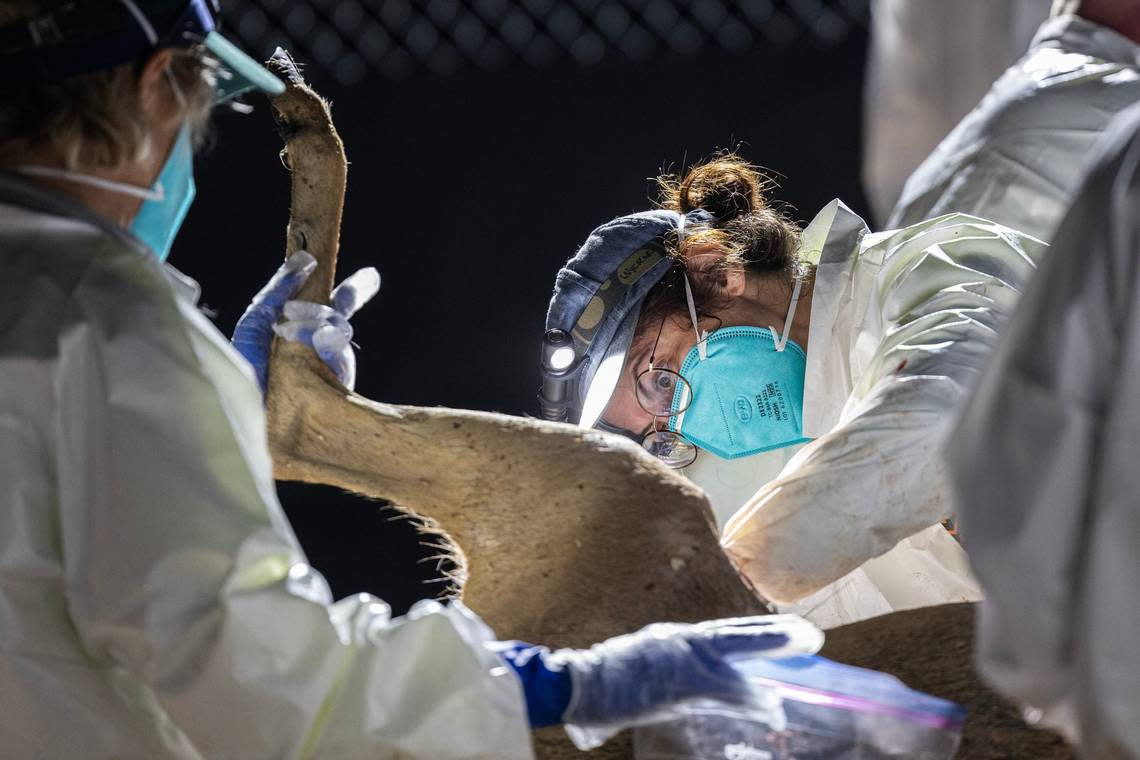Wasting disease is serious threat to deer. Let’s back Texas’ effort to deal with it | Opinion

Chronic wasting disease, or CWD, poses a serious threat to Texas’ deer population, especially in light of the recent outbreak in captive deer — with more than 15 new CWD-positive facilities identified in just the last year.
Similar to mad cow disease or scrapie in sheep and goats, CWD is highly contagious and 100% fatal. Infected deer literally waste away, exhibiting dramatic weight loss and abnormal behavior. CWD spreads through saliva, blood and other bodily fluids, and once an area is infected, it persists in the soil and on surfaces even after the deer are gone.
In Texas, deer hunting generates $9.6 billion annually according to a recent Texas A&M study, a major income source for ranches and rural communities. The spread of CWD would harm Texas deer herds and the economic sustainability of ranches and communities across the state.
Mad cow disease jumped species to humans in the U.K. in the 1980s. Recent evidence raises concerns that cases of the acute dementing disease of Creutzfeldt-Jakob disease, the human version of all the awful animal diseases mentioned above, could be linked to consumption of CWD-infected venison. Like mad cow disease, with increased prevalence, CWD could jump species and spread from animals to humans.
According to the state constitution, all wildlife in Texas is owned by the citizens of the state and managed for public benefit by the Texas Parks & Wildlife Department. However, in the 1980s, a new industry was born when the department issued permits to individual “breeders” to hold deer in pens and breed them for big antlers preferred by hunters.
We now know these facilities pose substantial risk for the spread of wildlife diseases such as CWD, especially when pen-raised deer are transported in livestock trailers and released to the wild for hunting. Of the 751 deer found to have CWD in Texas, 624 (83%) are associated with deer-breeding facilities.
The vast majority of Texas hunting ranches do not participate in deer breeding. According to the A&M study, 95% describe their herds as completely wild and native — with no introduced breeder deer. Other than some natural spread from New Mexico in the panhandle and far west Texas, the vast majority of the state does not have CWD, and we need to keep it that way.
Fringe voices would have you believe that CWD is not real and that Texas agencies are out of control in their response. They have spewed hateful rhetoric infused with misinformation about CWD in recent weeks. They have criticized and threatened the wildlife department and the staff of the Texas Animal Health Commission, despite these agencies’ dedicated efforts and authority to manage CWD on behalf of Texas’ 600,000 deer hunters, millions of wildlife enthusiasts and 250,000 rural landowners.
They have attacked the wildlife department for depopulating infected breeding facilities like that of an outspoken Hunt County deer breeder in late May. In the end, more than 250 deer succumbed to the deadly illness before officials were allowed in to euthanize the remaining diseased animals.
As is the case for many livestock diseases, including bovine tuberculosis and bird flu, depopulation of captive herds infected with CWD is widely seen as the best option. Think about the recent euthanasia of 2 million chickens in a Panhandle poultry facility because bird flu was discovered. It is unfortunate but necessary to humanely dispatch diseased animals to prevent a slow and painful death and to protect neighboring ranches and area wildlife.
At last count, 10 more deer breeding facilities that we know of are infected with CWD and remain populated. At least two of those have had deer escape from pens. They could be in your area.
If you are concerned about the health of Texas deer and deer hunting, please contact your elected officials, and ask them to demand aggressive action to halt the spread of CWD in Texas.
Visit www.cwdintexas.com to learn more and to get involved.
Ernest Angelo Jr. is a former Texas Parks and Wildlife Department commissioner and a landowner in Coleman County. Dr. Robert McFarlane owns the 7,500-acre BigWoods on the Trinity hunting preserve and was winner of the 2015 statewide Leopold Award for Conservation. Also contributing were Stephen J. “Tio” Kleberg, an heir to and former manager of the King Ranch who serves on the boards of several conservation, wildlife, hunting and livestock groups, and Larry Martin, whose Westwind Ranch in Zavala County is near two CWD infected deer breeding facilities.
Do you have an opinion on this topic? Tell us!
We love to hear from Texans with opinions on the news — and to publish those views in the Opinion section.
• Letters should be no more than 150 words.
• Writers should submit letters only once every 30 days.
• Include your name, address (including city of residence), phone number and email address, so we can contact you if we have questions.
You can submit a letter to the editor two ways:
• Email letters@star-telegram.com (preferred).
• Fill out this online form.
Please note: Letters will be edited for style and clarity. Publication is not guaranteed. The best letters are focused on one topic.

